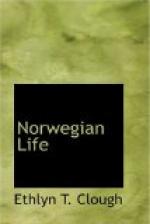This is the age of munificent benefactions in aid of science and learning. The Rhodes scholarships, Mr. Carnegie’s free libraries and educational endowments, the Duc d’Aumale’s gift to the French Academy of his fine chatteau at Chantilly, with its magnificent historical and art collections; many institutions founded in the United States and elsewhere by multi-millionaires for the advancement of knowledge, are a sign of the times. They foreshadow the abolishment of pauperism and its attendant charities to give place to beneficent institutions, and Norway and Sweden are abreast with other countries in this movement. Apart from charitable institutions and endowments for the maintenance of hospitals and asylums, of universities, scholarships and fellowships, which the generosity of former generations has secured, the present generation has seen noble donations made by private men for more special objects, having the general advancement of knowledge in view, such as the encouragement of scientific research and the support of voyages of geographical exploration. Nordenskioeld’s Arctic voyages, his and Palander’s navigation through the polar northeast passage in the Vega, Nathort’s exploration of King Carl’s Land, the Swedish expedition to the Antarctic regions under Otto Nordenskioeld, which has lately returned after two years’ adventurous exploration in Graham Land and the discovery of King Oscar Land, Sven Hedin’s travels in Central Asia, which have had such important results and made his works so widely read—all these were undertaken as the result of such aid. The latest case in point, Alfred Nobel’s foundation of annual prizes for the reward of scientific discovery, of literary merit, and humanitarian endeavor, deserves special notice. The annual distribution of these prizes, each of which represents a small fortune ($41,500), has of late years fixed the attention of the learned world on the Swedish literary and scientific bodies, and the Norwegian Parliamentary Committee, who were entrusted by him with the difficult and invidious task of awarding them.
Alfred Nobel, the dynamite king, as he was styled, belonged to a family of inventors and industrial magnates. His father, Emmanuel Nobel, was the inventor of nitroglycerine, and of fixed submarine torpedoes or mines. His two brothers, Robert and Louis Nobel, founded the naptha and petroleum works at Bacou, one of the largest industrial enterprises of Russia. Alfred himself invented dynamite and dynamite gum, and a smokeless powder, ballistite, which he patented in 1867, 1876, and 1889. It is mainly due to the works of the Nobel family that Sweden has attained the reputation of Master Producer of Explosives. Chemical research has always been a specialty among Swedish men of science, and a large number of the known chemical elements were discovered and made known by Swedish scientists.




